
Cataract Surgery, What to Expect Before, During, and After
Cataracts are a common eye condition, especially in older adults, where the lens of the eye becomes cloudy, leading to blurred vision. If left untreated, cataracts can cause significant vision loss and interfere with daily activities. Cataract surgery is a safe and effective procedure to restore clear vision. In this article, we’ll guide you through everything you need to know about cataract surgery — from the initial consultation to post-surgery care.
What Are Cataracts?
Cataracts occur when the proteins in the eye’s natural lens break down and clump together, creating cloudy patches. This can result in:
- Blurred or cloudy vision
- Sensitivity to light
- Difficulty seeing at night
- Fading of colors
Cataracts can develop slowly over time, often going unnoticed until they start to impair vision. If you experience any of these symptoms, it’s essential to schedule an eye exam with your ophthalmologist to determine if cataract surgery is necessary.
Before Cataract Surgery: Consultation and Preparation
1. Initial Consultation
The first step is a thorough eye examination. Your ophthalmologist will assess the severity of the cataract and determine if surgery is the best option for restoring your vision. During this consultation, you will discuss:
- Your overall eye health
- Any medications you are taking
- The best type of intraocular lens (IOL) for your needs (standard, toric, or multifocal)
2. Pre-Surgery Preparations
Once you and your doctor decide to proceed with surgery, you’ll be given specific instructions to follow:
- Stop certain medications: Some medications may need to be paused a few days before the surgery.
- Arrange transportation: You won’t be able to drive after the procedure, so plan to have someone take you home.
- Eye drops: Your doctor may prescribe antibiotic or anti-inflammatory eye drops to use a few days before the surgery to prevent infection and inflammation.
